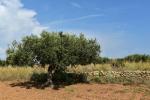
BIOLIVO Operational Group: Using olive varietal biodiversity to innovate and improve the competitiveness of olive groves in the Sierra de Cádiz
- Type Operational group
- Status In progress
- Execution 2024 -2025
- Assigned Budget 268.949,47 €
- Scope Autonómico
- Autonomous community Andalucía
- Project website GO BIOLIVO
Olive groves are one of the most important crops in Andalusia economically, socially, and environmentally, with a surface area of more than 1.6 million hectares. In the province of Cádiz, olive groves have long been a traditional crop in some areas, such as the Sierra de Cádiz region. Although they have not been one of the most important crops in the province, they have experienced a significant increase in area in recent years, rising from 23,000 hectares in 2010 to 30,000 hectares in 2022. However, this development of new plantations is based on very few varieties, specifically 'Picual' in bush olive groves and 'Arbequina' and 'Arbosana' in hedge olive groves. This contrasts with the great varietal diversity of the olive tree, as is the case in Andalusia, where more than 150 different varieties have been identified, 20% of which have been found in surveys carried out in recent years. In the province of Cádiz, these surveys have focused primarily on wild olive trees, given that this is where the largest populations in all of Andalusia are found. However, many cultivated areas in the province of Cádiz remain to be explored, where local varieties that are in great danger of disappearing could be located. The identification and study of these varieties would be of great interest because they could provide added value to the extra virgin olive oils produced in the province. This added value is important given that many cultivation areas in the Sierra de Cádiz are on sloping, dry land and cannot compete with high-density flatland plantations. Furthermore, these local varieties are adapted to mild winter climate conditions and therefore have low chilling requirements.
Varieties with a low winter chill requirement could be a highly useful tool for adapting olive cultivation throughout Andalusia to the global warming environment predicted in the coming decades. This global warming will also impact the quality of the olive oil, particularly by causing a drastic decrease in the oleic acid content of the oil and, therefore, its oxidative stability. Therefore, it is necessary to identify olive varieties with a genetic predisposition to achieve a high oleic acid content to mitigate the consequences of climate change on extra virgin olive oil. This is important for both mountain olive groves and intensive hedgerow olive groves, which, in the province of Cádiz, are planted primarily with the low-oleic acid Arbequina variety. The project's innovative potential lies in the development of adaptive strategies for olive groves in the province of Cádiz to adapt to the changing conditions of climate change, opting for native varieties better adapted to the current climate and with oils with higher oleic content, thereby offering differentiated quality products and, therefore, greater competitiveness in the sector. To this end, a series of actions are proposed:
- Olive grove prospecting and plant material identification.
- Adaptation of new varieties to hedgerow and bush olive groves, as well as to the environmental conditions of the province of Cádiz.
- Characterization of oils from new varieties Furthermore, through the use of ICTs using predictive models, we will be able to evaluate the behavior of olive groves in response to changes in temperature or variations in precipitation and surface areas, as well as the quality of the oil according to varieties and environmental conditions.
The purpose of this project is to study the varietal biodiversity of olive trees in the province of Cádiz, in order to offer differentiated quality products and improve the crop's competitiveness and adaptation to the new conditions of climate change. To this end, the project aims to conduct a study of the genetic diversity of ancient olive trees preserved on farms in the province of Cádiz. Two comparative trials will be conducted between hedgerow and bush varieties. Furthermore, the extra virgin olive oils obtained from their fruits will be characterized to determine the potential of these varieties. To this end, an interdisciplinary team has been formed, consisting of researchers from the University of Cádiz (UCA), technicians from the Cooperativa de los Remedios, the Agrifood Cooperatives, the Sierra de Cádiz Designation of Origin, and the Cádiz Provincial Council. The results of this experimentation and cooperation will be disseminated among the various stakeholders in the olive oil sector, using the communication channels of both the Andalusian Agri-Food Cooperatives and the various institutions participating in the project.
To achieve this general objective, different specific objectives have been established:
- Locate, prospect, and harvest olive varieties in the Province of Cádiz.
- Physicochemical characterization of the oils obtained from the harvested varieties.
- Characterization of EVOOs currently produced.
- Adaptation of new varieties to bush olive trials.
- Adaptation of new varieties to hedgerow olive grove trials.
- Characterization of the oils from the varieties surveyed in the Province of Cádiz.
- Development of a predictive model that identifies oil quality with the characteristics and environmental conditions of the prospected varieties.
What is the expected impact on potential users of the innovation? Impact on the community of producers and operators: Identification of olive varieties with a distinct organoleptic profile that can add value to the oils produced in the Province of Cádiz. Identification of olive varieties well adapted to future climatic conditions in a context of climate change. Comparative evaluation of the viability of bush and hedgerow cultivation systems under the climatic conditions of the Province of Cádiz and determination of the varieties best adapted to both cultivation systems. Impact on the processing industry: Obtaining extra virgin olive oils with greater stability that facilitate their commercialization. Impact on the end consumer: Availability of locally produced extra virgin olive oils with diverse organoleptic profiles and longer shelf life. Impact on the environment and human health: Identification of varieties more resilient to climate change and with improved nutraceutical properties.
- Locate, prospect, and collect olive varieties in the Province of Cádiz. A systematic location and prospecting of olive groves in the Province of Cádiz will be carried out, especially for old olive trees and locally unknown varieties. Leaf and fruit sampling will be carried out to determine their variety through morphological and DNA analysis. To this end, the samples will be compared with the IFAPA World Olive Germplasm Bank database, which includes more than 700 varieties from around the world.
- Physicochemical characterization of the oils obtained from the harvested varieties. After obtaining the oils from the selected varieties, a complete physical and chemical characterization will be performed to establish their qualities and specific profiles in certain compounds of interest. To this end, analyses will be performed on their acidity, peroxide value, UV absorption, oxidative stability, fatty acid composition, tocopherols, squalene, and phenolic compounds.
- Characterization of EVOOs currently produced. This involves conducting a current assessment of the oils produced in the Sierra de Cádiz Designation of Origin, taking into account different characteristics of location, variety, harvest season, cultivation system, oil mill processing, climate, etc.
- Adaptation of new varieties to olive tree trials in bush-planting. A selection of olive varieties will be made, including some from the IFAPA olive tree improvement program and others from the survey carried out in objective 1, to establish a comparative trial of varieties in an intensive bush-planting system. This trial could be a starting point for future demonstration projects on pruning, harvesting, and organoleptic differences between single-variety oils.
- Adaptation of new varieties to hedgerow olive grove trials. A hedgerow olive variety trial will be conducted with varieties specifically adapted to this cultivation system. As with the previous trial, the trial will be arranged in several random blocks, with each variety in complete rows to enable individual harvesting of each variety. This trial could serve as a starting point for future demonstration projects on the viability of hedgerow olive groves, pruning, harvesting, and organoleptic differences between single-variety oils.
- Characterization of the oils from the varieties surveyed in the Province of Cádiz. Representative trees of local varieties from the Province of Cádiz that have sufficient yields during the project year will be selected. Sufficient oil will be extracted from these trees to conduct a comparative tasting. These oils will be combined with other representative oils from the Sierra de Cádiz Designation of Origin, also obtained during the project year.
- Development of a predictive model that identifies oil quality with the characteristics and environmental conditions of the varieties surveyed. Data loggers will be placed on the representative trees surveyed in the Province of Cádiz to record ambient and soil temperatures. The recorded environmental differences will be correlated with differences in oil yield and oil composition obtained. The results generated from the experimentation and cooperation will be disseminated among the various stakeholders in the olive oil sector.
For decades, olive cultivation has been subject to global expansion, primarily due to the high profitability achieved by new cultivation systems and the significant nutritional and health benefits of extra virgin olive oil. Traditional varieties have been planted in new areas, both in countries where olive trees were not widely grown (China or Australia) and in producing countries where olives were not widely cultivated. Some of these traditional varieties, when planted outside their areas of origin, have shown serious problems at certain stages of their production.
This has led to yield losses or defective oil production due to environmental conditions. This is partly due to the lack of systematic research to determine the influence of different environmental conditions on the most widely cultivated olive varieties. Therefore, evaluating the genotype x environment interaction on these traits is essential to answering these questions and will help predict crop performance under the effects of climate change.
At the provincial level of Cádiz, this problem is manifested in the quality of current oils with "non-native" varieties with lower oleic acid content. Combined with environmental changes due to climate change, this makes it necessary to identify olive varieties with a genetic predisposition to achieve high oleic acid content, in order to mitigate the consequences of climate change on extra virgin olive oil. This is important for both mountain olive groves and intensive hedgerow olive groves, which in the province of Cádiz are planted primarily with the 'Arbequina' variety, with its low oleic acid content. To this end, a project is being proposed to locate ancient and endangered olive varieties in the province of Cádiz.
These varieties could be better adapted to climate change conditions because they are grown in a region with a warm climate and on dryland land. Subsequent trials will be conducted to determine how these varieties adapt to hedgerow and bush-cultivated olive groves under the environmental conditions of the province of Cádiz. To this end, a complete physicochemical characterization of their oils will be performed to establish their qualities and specific profiles of certain compounds of interest.
The purpose of this project is to study the varietal biodiversity of olive trees in the province of Cádiz, in order to offer differentiated quality products and improve the crop's competitiveness and adaptation to the changing conditions of climate change. To this end, the project aims to conduct a study of the genetic diversity of ancient olive trees preserved on farms in the province of Cádiz. Two comparative trials will be conducted between hedgerow and bush varieties. In addition, the extra virgin olive oils obtained from their fruits will be characterized to determine the potential of these varieties.
- Coordinator/entity name: Agro-Food Cooperatives of Andalusia
- Postal address: Calle Demetriio de los Ríos 15, 41003, Seville
- Coordinator/entity email: cdiaz@agroalimentarias-andalucia.coop
- Telephone: 954422416
- Coperativas Agroalimentarias de Andalucía
- UNIVERSIDAD DE CÁDIZ (ana.jimenezcantizano@uca.es)
- LOS REMEDIOS PICASAT SCA (tecnico2@remediospicasat.com)
- DIPUTACIÓN DE CÁDIZ (joseantonio.iglesias.brantuas@dipucadiz.es)
- DENOMINACIÓN DE ORIGEN SIERRA DE CÁDIZ (info@dopsierradecadiz.com)
- Coperativas Agroalimentarias de Andalucía







